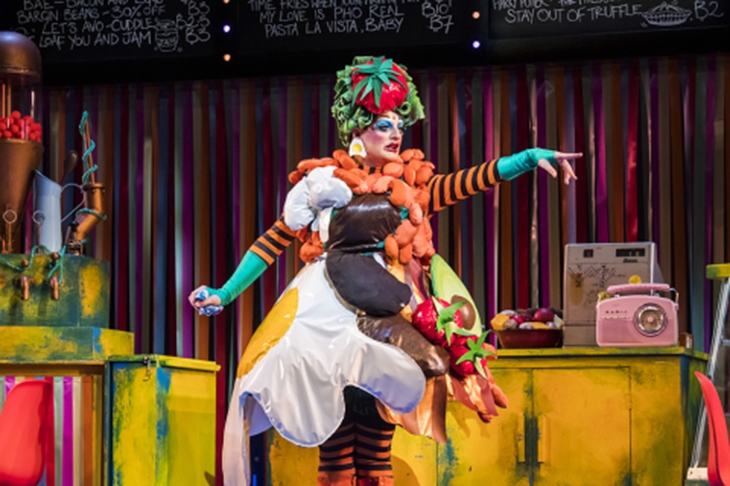The Duchess of Malfi is one of those classics that everyone knows by name but not many have witnessed on stage. So a production is likely to attract theatre-goers who feel they ‘ought to’ see it rather than ‘want to’. This may have affected the Almeida’s version which is opaque and almost impossible to follow. Yet audience members who are expecting punishment rather than entertainment will not be disappointed.
The play by John Webster was first presented in London in 1613 (or possibly a year later), and it relies on events that occurred in Italy more than a century earlier between 1508 and 1513. So even the original London audience would have had to work hard to follow the unfamiliar plot which traces the elopement of an Italian duchess with her steward. She bears him three children while her jealous brothers, one of whom is a cardinal, send a spy to monitor her actions. She hatches a counter-intrigue and pretends that the steward has been driven into exile under suspicion of stealing her jewellery. Complicated subplots proliferate involving secret informers, disguised assassins, strangulations that go wrong, and a bizarre passage in which Ferdinand, the Duchess’s insane twin brother, succumbs to the delusion that he’s a wolf.
Words like ‘cripple’, ‘freak’ and ‘retard’ are bandied about with refreshing candour
Rebecca Frecknall’s show uses modern dress and this decision destroys a key element in the story: social pedigree. The brothers are angered that the Duchess has imperilled the family fortune and tarnished their good name by marrying a lowly steward. Yet it’s impossible to discern the variations in rank between any of the characters because all the cast are togged up in the same dreary high-street casualwear. Period costume would at least have given us a chance to note the difference between the Duchess, the Prince, the Cardinal, the manservant and the lady’s maid.
Although Webster was Shakespeare’s contemporary, his qualities as a dramatist are inestimably inferior. Nearly every character here is a greedy, cold-hearted cut-throat, and even the most sympathetic figure, the Duchess who marries for love, is hard to identify with. The male cast members are untroubled by either good looks or charisma. The female lead, Lydia Wilson, is perfectly watchable although it’s unclear why she was required to perform in a Toyah Willcox hairdo. The drama culminates with a gruesome display of three female corpses on the bench of a squash-court changing-room. Some might consider this emotionally moving. I found my sentiments wavering between nausea and boredom.
Teenage Dick may sound like an adolescent sex comedy but the play, by American writer Mike Lew, is an update of Richard III. The fact that Lew has not won, or been nominated for, the Pulitzer Prize will alert British theatre-goers to the possibility that his show may be worth seeing. The script announces its raw verbal frankness from the start. We’re in a classroom where the work of Machiavelli is being taught to a group of teenagers, some of whom are disabled. Dick, who walks with a crutch, arrives late but he objects to being compared with Buck, in a wheelchair, who has shown up on time. ‘Buck is on wheels, you pox-scrabbled harlot,’ he shouts at a fellow pupil. ‘Do I look like a race car?’ When he asks how a politician should avoid being hated, he’s told, ‘It’s easy, Dick. Talk less, shower more.’ The script maintains this light, bantering tone throughout and the performers brilliantly capture the casual, needling cruelty of teenage school kids.
Because the cast includes disabled actors, the show is free to dispense with the niceties of current usage. Words like ‘cripple’, ‘freak’ and ‘retard’ are bandied about with refreshing candour. There’s even a gruesome scene in which the able-bodied Eddie kicks Dick’s crutch away and viciously beats him while he sprawls helplessly on the ground.
In Shakespeare’s original, Richard sought the English throne, and in this version Dick has to challenge his rival, Eddie, and win election as the senior-year president. Dick’s secondary mission is to woo the class beauty, Ann Margaret, and persuade her to accompany him to the end-of-term disco. This dance forms the climax of the show and all the characters, including those with impaired movement, let rip with irresistible energy. The audience rose to its feet in raptures on press night.
Daniel Monks stands out as the tortured but sexy Dick who defies the odds and comes out on top. Ruth Madeley is quietly hilarious as the forlorn Buck. Susan Wokoma delivers a wonderfully witty turn as Elizabeth York. The production, directed by Michael Longhurst, must be a strong candidate for a transfer to larger premises. A word of advice to teenagers whose parents are threatening them with tickets to this show. It’s not a Shakespearean tragedy. The whole thing is great fun and as light as a feather.







Comments